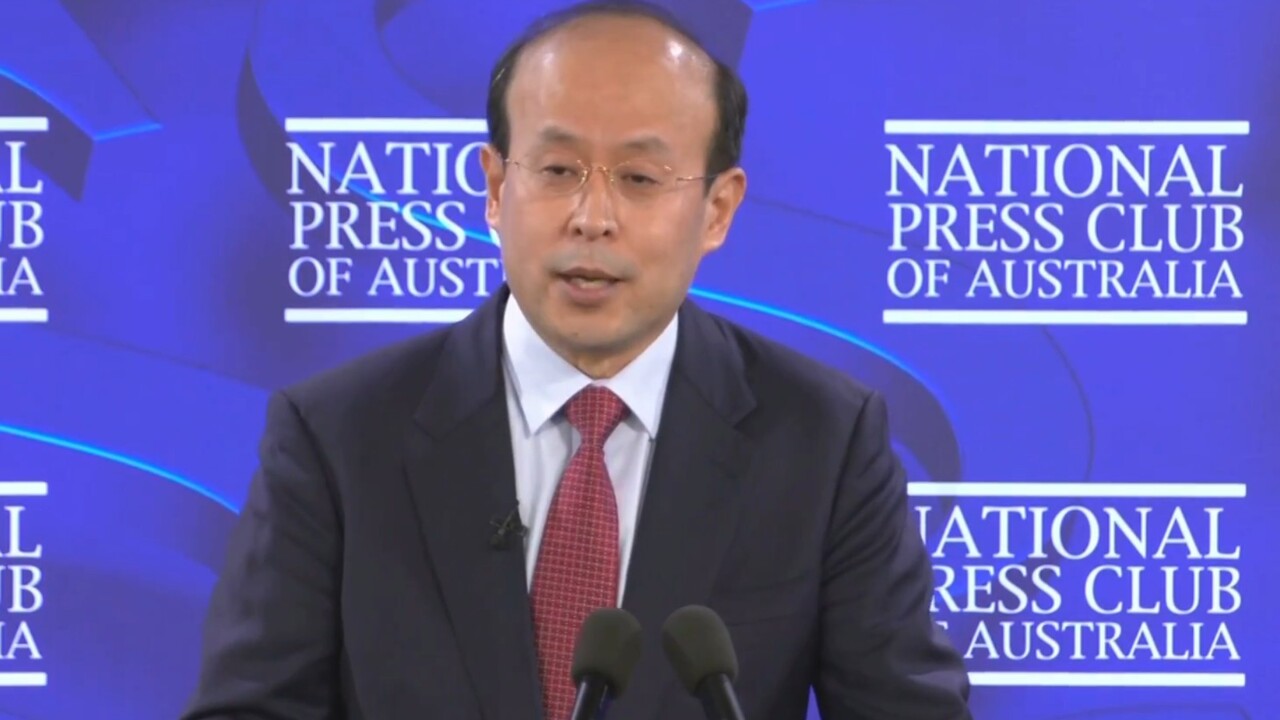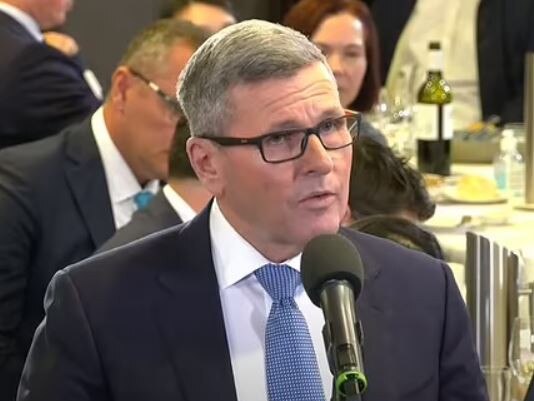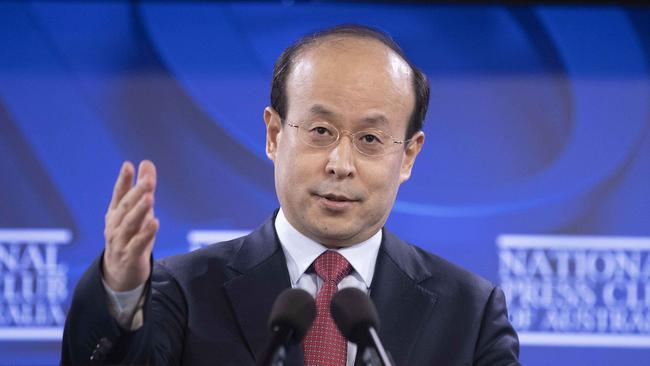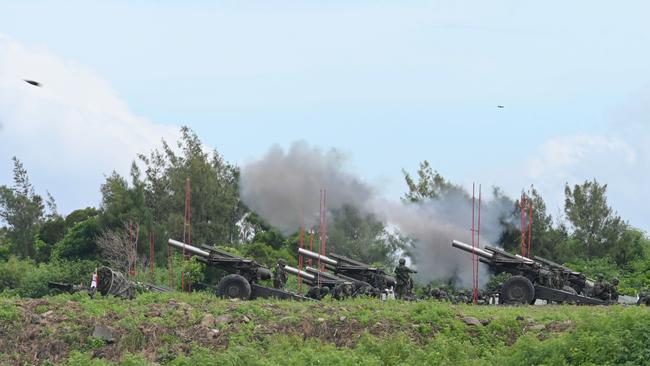‘You do not do what you say’: Reporter grills Chinese ambassador over recent issues with Australia
An Australian reporter has pinned the Chinese ambassador to Australia at the National Press Club.

National
Don't miss out on the headlines from National. Followed categories will be added to My News.
A reporter has pinned the Chinese ambassador to Australia at the National Press Club, pressuring him over a number of reasons why “Australia doesn’t trust China”.
Xiao Qian on Wednesday addressed the National Press Club, where he spoke about the future of the Australian-Chinese relationship before taking wide-ranging questions from Australian journalists.
Mr Xiao, who was appointed to his diplomatic post in January, delivered his speech against the backdrop of escalating tensions between Taiwan and China.
Beijing is reported to have fired 11 ballistic missiles towards Taiwan and carried out simulated military drills following US House Speaker Nancy Pelosi’s visit to the self-governed island last week.
China maintains that Taiwan is a breakaway state and not a sovereign country. Mr Xiao said on Wednesday there was “absolutely no room for us to compromise on the question of Taiwan”.
Channel Nine’s Chris Uhlmann asked the ambassador why China has not lived up to its promises to Australia.
“Do you see why some Australians think when you talk about international law and positive policies, you do not do what you say?” Uhlmann asked, listing a number of incidents he wished Mr Xiao to address.
There have been a number of squabbles between the two nations in recent months, including Beijing‘s militarisation of the South China Sea, threatening an Australian Air Force aircraft flying over disputed islands, imprisoning an Australian citizen without basic rights to justice, cyber attacks and political interference.

Mr Xiao defended China’s behaviour in the South China Sea, insisting they were “necessary measures we have to take to protect the security of the areas which belong to us”.
Beijing has maintained it is acting within the scope of safeguarding its sovereignty and territorial integrity and has accused Australia of “violating the UN Charter”.
Australia currently adheres to a one-China policy, meaning it does not recognise Taiwan as a country, although it maintains unofficial contacts there to promote economic, trade and cultural interests.
Mr Xiao on Wednesday insisted that Taiwan was a “province of the People’s Republic of China” and “not an independent state”.
“I would rather not use the word ‘invasion’ when we talk China and Taiwan. Taiwan is different from any other scenario or situation,” he said.
Reflecting on recent accusations that a Chinese fighter jet carried out a dangerous manoeuvre by cutting in front of an Australian surveillance plane, he described the incident as very unfortunate.
“It happened, in the South China Sea in general, it’s a big area,’’ he said.
“It happened at a particular location. That location is within the territorial space of an island that belongs to China.
“So just like you — you’re in your house, within your compound, somebody is driving around, carrying a gun and trying to peep into your windows. You would feel threatened and feel uncomfortable. So you have to come out and tell those people to keep their distance, at least.”

Mr Xiao also insisted most people in Taiwan consider themselves Chinese.
“There are 23 million people in Taiwan. Don’t they get a say in what should happen to their future?
“The future of Taiwan will be decided by 1.4 billion Chinese people,” he said.
“And at the same time, I believe that the majority of the people in Taiwan believe they’re Chinese. They believe Taiwan is part of China and Taiwan is a province of China. They are for reunion.”
That assertion contradicts a wealth of data measuring the stance of Taiwan’s people.
According to data from National Chengchi University’s Election Study Centre, for example, a mere 2.4 per cent of Taiwanese consider themselves Chinese. A further 30.4 per cent believe they are both Chinese and Taiwanese.
Meanwhile a hefty 63.7 per cent majority consider themselves solely Taiwanese.
The same data shows a majority of Taiwan’s population wants to maintain the political status quo for now, while just 1.3 per cent of people wish to move quickly towards unification with China.
The Democratic Progressive Party, which is pro-independence, has won the last two elections.
Confronted with the opinion polling, Mr Xiao dismissed it as “misleading”.
“I think it is quite obvious that even the people in Taiwan who are in power in the local government, even officials in Taiwan, believe they are Chinese. They want to be part of China, to have Taiwan be part of China” he claimed.

During his press club address, the ambassador also said China was willing to use “all necessary means” in relation to Taiwan, warning that there was “no room for compromise” to protect its sovereignty.
Rejecting the word invasion and arguing Taiwan should be peacefully reunited with “the Motherland”, he suggested Australians “use their imagination” about what that means.
Mr Xiao was asked about China’s new White Paper on Taiwan that asserts it will “not renounce the use of force and we reserve the option of taking all necessary measures”.
“Can you explain to Australians who are concerned and worried about the prospect of a Chinese invasion of Taiwan and the inevitable consequences of that invasion, what constitutes precisely in the minds of the Chinese Government a ‘compelling circumstance’ that would justify a use of force across the Strait?,’’ the ambassador was asked.
“First, I would rather not use the word ‘invasion’ when we talk about China and Taiwan,’’ Mr Xiao replied.
“Taiwan is different from any other scenario or situation.
“Taiwan is not an independent state. It’s not an independent state. Taiwan is a province of the People’s Republic of China.
“It’s an issue of reunification, complete reunification, and the issue of Taiwan coming back to the motherland.
“China has been so patient for several decades we’re waiting. We are waiting for a peaceful unification.
“But we cannot — we can never rule out the option to use other means so when necessary, when compelled, we are ready to use all necessary means. As to what does it mean ‘all necessary means’? You can use your imagination.”
Originally published as ‘You do not do what you say’: Reporter grills Chinese ambassador over recent issues with Australia


